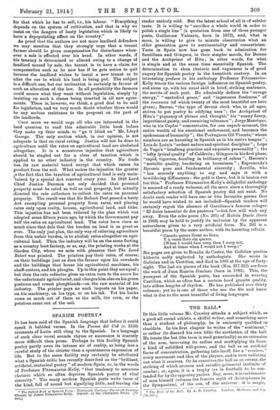SPANISH POETRY.* 1r Las been said of the Spanish language
that before it could speak it babbled verses. In the Poona del Cid (c. 1150) remnants of Latin still cling to the Spanish. In a language of such clear vowel sounds rhyme or assonance is scarcely more difficult than prose. Perhaps to this facility Spanish poetry partly owes its intense air of reality, as being less a careful study of the cloister than a spontaneous expression of life. But to the some facility may certainly be attributed what a Spanish critic has recently described as the "brilliant, artificial, oratorical poetry" of modern Spain, or, in the words of Professor Fitzmaurice-Kelly, 'that tendency to sonorous rhetoric which so often deprives Spanish poetry of vital sincerity." Too many modern Spanish poets write verse of the kind, full of sound but signifying little, and leaving the
• The Orford B“k Spanieh Terse ThirteenthtCterc=rnp Centr. reader entirely cold. . But the latest school of all is of subtler taste. It is willing to 'sacrifice a whole world in order to polish a single line" (a quotation from one of these younger poets, Guilherme Valencia, born in 1872), and, what is more, is willing to give to minute observation what an older generation gave to sentimentality and romanticism. Taste in Spain now has gone back to admiration for Santillana and Gdngora, in their simpler moods, for liereeo and. the Archpriest of Hits; in other words, for what is simple and at the same time essentially Spanish. The determination to shun rhetoric and vagueness is of good augury for Spanish poetry in the twentieth century. In an interesting preface to his anthology Professor Fitzmanrice- Kelly traces the various foreign influences on Spanish poetry, and sums up, with his usual skill in brief, striking sentences, the merits of each poet. Ile admirably defines the "savage energy," " =studied grace," and "ingenuous freshness" of the romances (of which twenty of the most beautiful are here given) ; Berceo, "the type of devout clerk who, in all ages, strives to put poetry to edifying uses "; the Archpriest of Hita's "piquancy of phrase and thought," his "sunny fancy, impertinent gaiety, and conniving tolerance "; Jorge Manrique, who in his Copies "concentrates, for one superb moment, the entire wealth of his emotional endowment, and becomes the
e pokeetuan of humanity" ; the Portuguese Gil Vicente," whose numbers are as haunting in Spanish as in his native tongue"; Luis de LeOn's "ardent nature and spiritual discipline" ; Lope de Vega's "headlong practice and exquisite personality" ; the "lofty lyrical quality " of Calderon; Gengora in his first phase, "rapid, vigorous, dazzling in brilliancy of colour"; Herrera's "metallic quality, bordering on brassiness " ; Espronceda's Byronic pose and fundamental sincerity ; Zorrilla, who "has scarcely anything to say and says it with a bewildering diffuseness the gold is there, but it is beaten out too thin." Professor Fitzmaurice-Kelly's delightful anthology is assured of a ready welcome, all the more since a thoroughly satisfactory selection of Spanish poetry did not exist. No doubt each reader will have one or two favourite poems that he would have wished to see included—Spanish readers will certainly regret the absence of Garcilasso's famous eclogue "El dulce lamentar de dos pastores "—but few will wish any away. Even the echo poem (No. 205) of Ruben Dello thorn in 1868) may be held to justify its inclusion by the apparent naturalness given to a very artificial form. No. 203 is a beautiful poem by the same author, with its haunting refrain Cuando miler° floras no Here, Y a verse Uoro sin querer.
(When I would fain weep then I weep not. And at times when I would not I weep.) " Six pages are given to Rosalie de Castro, the Galician poetese hitherto sadly neglected by anthologists. She wrote in Galician and in Castilian, and died in 1885 at the age of forty. eight. The last six poems of the book (Nos. 217-222) are from the work of Juan RaptOn Jimenez (born in 3E81). This, the youngest of the Spanish poets, has succeeded in weaving Castilian, which so often has a certain hard granite quality, into silken lengths of rhythm. He has published over thirty volumes; yet he is one of those who use the file and know what is due to the most beautiful of living languages.














































 Previous page
Previous page